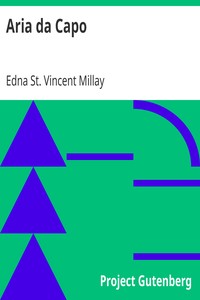Aria da Capo by Edna St. Vincent Millay
"Aria da Capo" by Edna St. Vincent Millay is a play in one act written in the early 20th century. This theatrical work presents a whimsical yet poignant narrative that delves into themes of love, the intricacies of relationships, and the contrast between tragedy and farce. Set within a colorful and metaphorical framework, it intertwines elements of both comedy and seriousness, presenting a unique commentary on human emotions and societal expectations. The
story unfolds in a two-part structure, beginning with the main characters, Pierrot and Columbine, engaged in a seemingly trivial dining conversation filled with humor and banter. Their light-hearted interaction is interrupted by Cothurnus, a figure representing the weight of tragedy, who attempts to integrate a more serious tone. Meanwhile, shepherds Thyrsis and Corydon illustrate their own narrative of conflict and disillusionment as they quarrel over imaginary boundaries between themselves and their sheep. The play juxtaposes these two dialogues, ultimately leading to a tragic conclusion where misunderstandings and jealousy culminate in violent circumstances, only to be ignored and transformed back into farce by Pierrot and Columbine. This cyclical structure emphasizes the absurdity of life, a reflection on the human condition wrapped in humor and sorrow. (This is an automatically generated summary.)
Read or download for free
| How to read | Url | Size | |||
|---|---|---|---|---|---|
| Read now! | https://www.gutenberg.org/ebooks/5790.html.images | 74 kB | |||
| EPUB3 (E-readers incl. Send-to-Kindle) | https://www.gutenberg.org/ebooks/5790.epub3.images | 95 kB | |||
| EPUB (older E-readers) | https://www.gutenberg.org/ebooks/5790.epub.images | 94 kB | |||
| EPUB (no images, older E-readers) | https://www.gutenberg.org/ebooks/5790.epub.noimages | 78 kB | |||
| Kindle | https://www.gutenberg.org/ebooks/5790.kf8.images | 177 kB | |||
| older Kindles | https://www.gutenberg.org/ebooks/5790.kindle.images | 169 kB | |||
| Plain Text UTF-8 | https://www.gutenberg.org/ebooks/5790.txt.utf-8 | 60 kB | |||
| Download HTML (zip) | https://www.gutenberg.org/cache/epub/5790/pg5790-h.zip | 92 kB | |||
| There may be more files related to this item. | |||||
Similar Books
About this eBook
| Author | Millay, Edna St. Vincent, 1892-1950 |
|---|---|
| Title | Aria da Capo |
| Credits | Produced by David Starner, and David Widger |
| Reading Level | Reading ease score: 84.4 (6th grade). Easy to read. |
| Language | English |
| LoC Class | PS: Language and Literatures: American and Canadian literature |
| Subject | War -- Drama |
| Subject | Didactic drama |
| Subject | Shepherds -- Drama |
| Subject | Friendship -- Drama |
| Subject | Alienation (Social psychology) -- Drama |
| Category | Text |
| EBook-No. | 5790 |
| Release Date | May 1, 2004 |
| Most Recently Updated | Feb 7, 2013 |
| Copyright Status | Public domain in the USA. |
| Downloads | 585 downloads in the last 30 days. |
| Project Gutenberg eBooks are always free! | |

